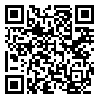BibTeX | RIS | EndNote | Medlars | ProCite | Reference Manager | RefWorks
Send citation to:
URL: http://tumj.tums.ac.ir/article-1-7540-en.html
2- Department of Pharmacology School of Medicine, Tehran Uni-versity of Medical Sciences, Teh-ran, Iran. ,
3- Cognitive and Neuroscience Re-search Center (CNRC), Medical Genomics Research Center and School of Advanced Sciences in Medicine, Islamic Azad Universi-ty, Tehran Medical Sciences Branch, Tehran, Iran.
Background: As a psychoactive plant, Cannabis sativa (Marijuana) is widely used throughout the world. Several investigations have indicated that administration of Marijuana affects various cognitive and non-cognitive behaviors. These include anxiety-like behaviors and learning and memory deficit. It has been shown that three main cannabinoid receptors [i.e. CB1, CB2 and CB3 are involved in cannabinoids’ functions. CB1 receptors are abundantly expressed in the central nervous system regions such as hippocampus, amygdala, cerebellum and the cortex. Therefore, the neuropsychological functions of endocannabinoids are thought to be more linked to CB1 receptors. Among other brain regions, CB1 is highly expressed in the amygdala which is an integral component of the limbic circuitry. The amygdala plays a major role in the control of emotional behavior, including conditioned fear and anxiety. In present study we examined the possible roles of basolateral amygdala (BLA) GABAB receptors in arachydonilcyclopropylamide (ACPA)-induced anxiolytic-like effect and aversive memory deficit in adult male mice.
Methods: This experimental study was conducted from September 2013 to December 2014 in Institute for Studies in Theoretical Physics and Mathematics, School of Cognitive Sciences, Tehran and Male albino NMRI mice (Pasture Institute, Iran), weighting 27-30 g, were used. Bilateral guide-cannulae were implanted to allow intra BLA microinjection of the drugs. We used Elevated Plus Maze (EPM) to examine memory and anxiety behavior (test-retest protocol). ACPA administrate intra-peritoneal and GABAB agonist and antagonist administrated intra-amygdala.
Results: Data showed that pre-test treatment with ACPA induced anxiolytic-like and aversive memory deficit The results revealed that pre-test intra-BLA infusion of baclofen (GABAB receptor agonist) impaired the aversive memory while phaclofen (GABAB receptor antagonist) improved it. Interestingly, pretreatment with a sub-threshold dose of baclofen reversed and potentiated anxiolytic-like effect and aversive memory deficit induced by ACPA, respectively. Conversely, similar effect with sub-threshold dose of phaclofen showed that this drug only restored aversive memory deficit but did not alter anxiolytic-like effect induced by ACPA.
Conclusion: Data indicated that BLA GABAB receptors have critical and different roles in anxiolytic-like effect and aversive memory deficit induced by ACPA.
| Rights and permissions | |
 |
This work is licensed under a Creative Commons Attribution-NonCommercial 4.0 International License. |





